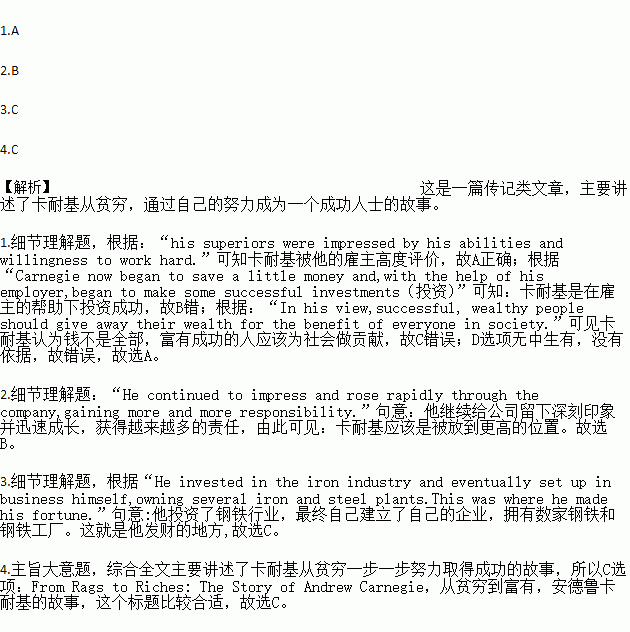题目内容
One of the greatest stories of rags to riches success is that of Andrew Carnegie,who started life in Poverty but became the richest man in the world.
Carnegie was born in Scotland in 1837,the son of a weaver.In 1848,the.family moved to the United States and at 13 Carnegie began work in a cotton mill,earning $1.5 per week.About three years later,he found a better job as a telegraph messenger boy.At work,his superiors were impressed by his abilities and willingness to work hard.In 1853, he gained an office job at the Pennsylvania Railroad Company.This was his first big break.He continued to impress and rose rapidly through the company,gaining more and more responsibility.At the same time,Carnegie loved reading very much and made use of every opportunity to visit the library.He rend widely on all subjects,particularly literature.
Carnegie now began to save a little money and,with the help of his employer,began to make some successful investments(投资).He invested in the iron industry and eventually set up in business himself,owning several iron and steel plants.This was where he made his fortune.By the 1890s,the Carnegie Steel Company was the biggest and most successful business in the world.
Carnegie had always believed that the pursuit(追求)of wealth was never an end in itself.In his view,successful, wealthy people should give away their wealth for the benefit of everyone in society.True to his word,in 1901,at the age of 66,he retired from business and devoted the rest of his life to charity work.
Carnegie's lack of formal education and his poor family background clearly didn't influence his success.His rapid rise from poverty to wealth was due to his willingness to work hard,his intelligence and good business sense, and his talent for making things happen.He died in 1919 at the age of 83.
1.What can be learnt from the text?
A. Carnegie was highly thought of by his employers.
B. Carnegie made his investments independently.
C. Carnegie believed that money was everything.
D. Carnegie could have been more successful if he had been formally educated.
2.What does "gaining more and more responsibility" in the second paragraph most probably mean?
A. Becoming more and more intelligent. B. Being put to higher positions.
C. Having a better sense of confidence. D. Reading more and more books.
3.How did Carnegie finally make a big fortune?.
A. His employer helped him. B. He was much paid when working.
C. He set up his own business. D. He saved money year by year.
4.Which of the followings will be the suitable title for the text?
A. Andrew Carnegie: A Wealthy Man
B. Steel & Iron: The Most Profitable Business
C. From Rags to Riches: The Story of Andrew Carnegie
D. Intelligence and Good Business Sense: Two Factors in Becoming Rich
 阅读快车系列答案
阅读快车系列答案
